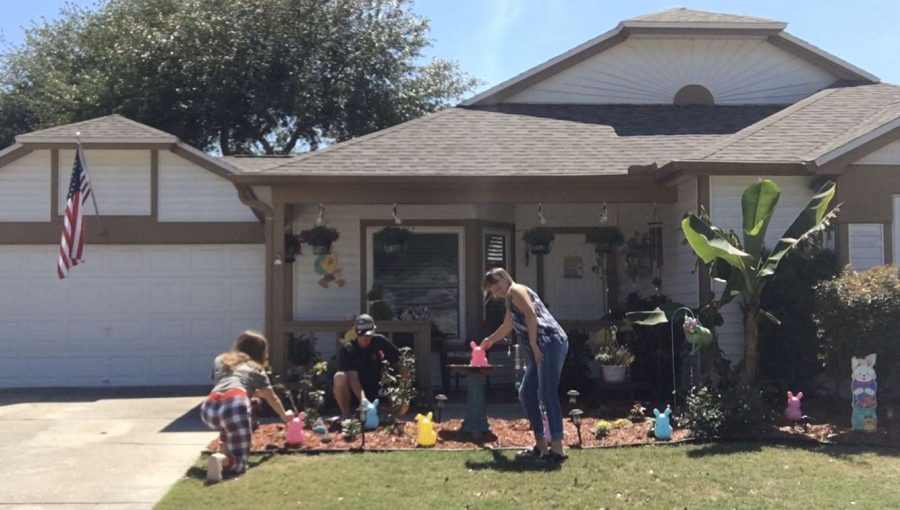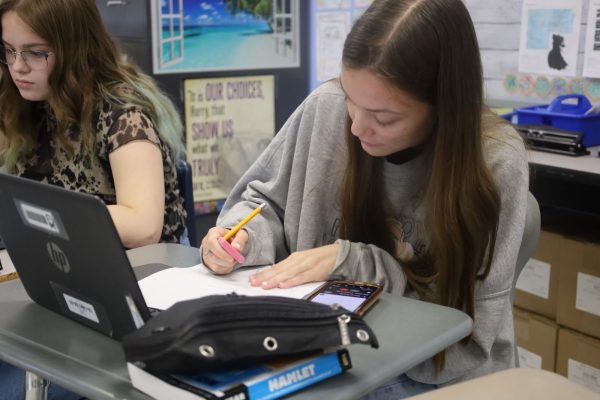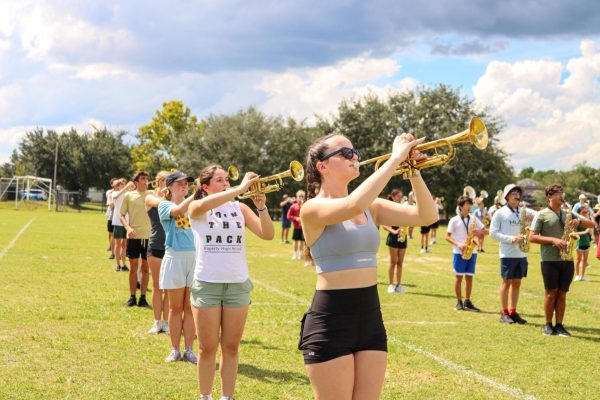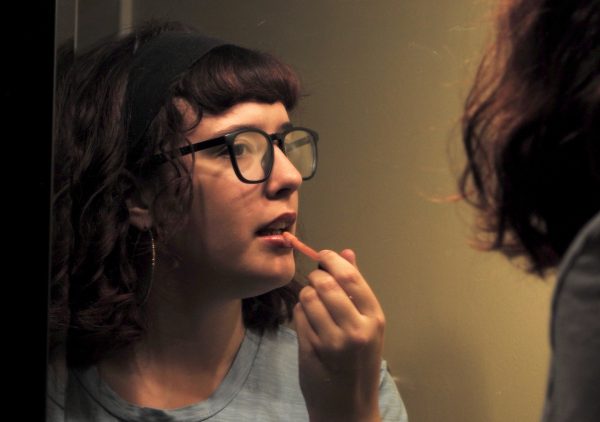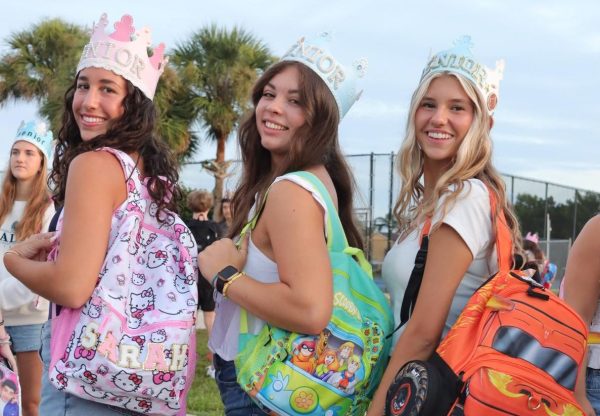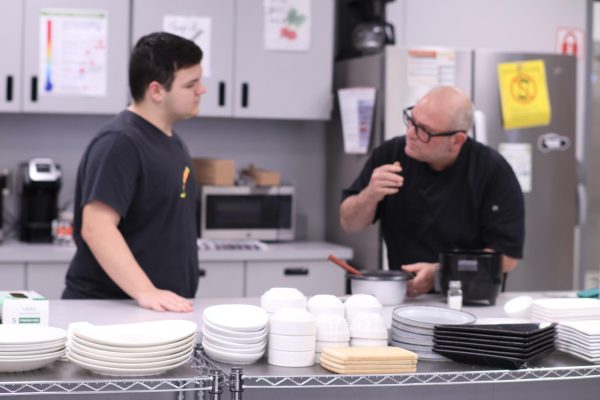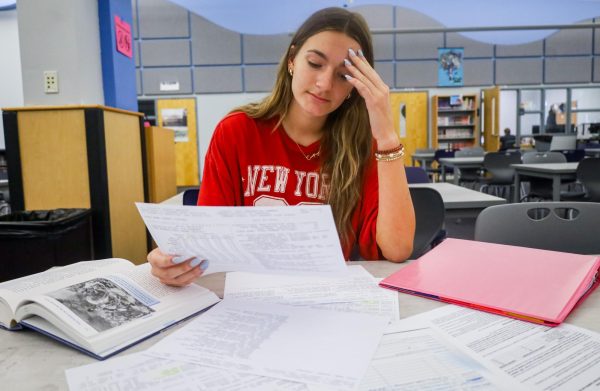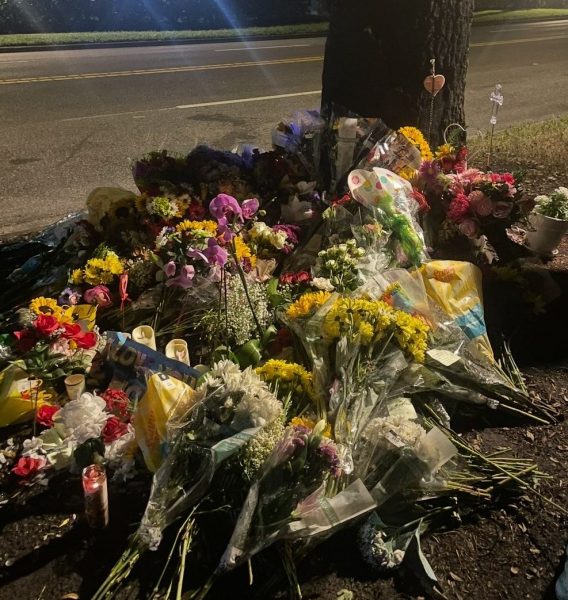All in the family
As COVID-19 affects Seminole County, reaching Oviedo, students and their families’ daily lives are impacted.
photo by Samantha Worsham
Junior Samantha Worsham and her family always decorate their yard for every holiday. Despite the quarantine effect, Worsham and her family continue to set up inflatable bunnies for Easter.
After posting a blurry photo to social media platform Snapchat, captioned with an all-caps complaint against his mother, it was clear that junior Talen Hulshof was still adjusting to the changes made in his household due to COVID-19. Hulshof was irritated after having to wipe down and sanitize all of the groceries before putting them away.
Hulshof’s mother had heard a story of a family dying after contracting the virus and implemented stricter measures. With numerous horror stories and ongoing news and reports from every media outlet, the severity of the crisis has caused many to worry, where previously, there had been little to no concern.
Junior Alexander Valentin’s parents have changed their previously relaxed attitude due to their fear of the virus’ spread.
“Mine have started to get rather strict about it, but they were not as much at the early times of social distancing,” Valentin said.
Valentin had spent the day with a friend a week ago, but has not gone out again, nor has he had any friends over. This is a common rule many families follow, despite some students’ protests.
“My family has not let anyone in or out, other than a few times. They have been stingy about letting us go out,” sophomore Sebastian Fernandez said. “Days ago, I went to my girlfriend’s house. It was a pain to convince them.”
Many had planned spring break activities with friends and extended family and looked forward to returning to school after the intended week-long break. Junior Laila Viator was disappointed to hear that spring sports and other school-related activities were canceled or postponed.
Her family was more lenient on allowing people in and outside the house than others. Viator could still see her friends and her boyfriend, as long as she practiced thorough hygiene habits, such as those recommended to the Centers for Disease Control and Prevention.
Junior Samantha Worsham is also allowed to see friends, however her parents have divided views on the virus. Her mother is slightly concerned, but less urgent about the situation. Her father is described as an “extremist,” comparing COVID-19 to the Black Plague and fearing the worst.
Despite cases in the US reaching high numbers, the New York Post finds fatality is more prevalent in older generations and in those with underlying conditions. There are also outlying cases that are given special attention and coverage.
Still, families in Oviedo are careful, especially those with members who are more susceptible to the virus. Zeini’s mother works as a nurse and also takes medicine that compromises her immune system. To combat the higher risk, she changes out of work clothes in the garage to avoid bringing the disease into the house.
Maintaining the immune system is an important step in being healthy, which is why those in certain situations must take extra care. Viator’s sister lives with type 1 diabetes, meaning the whole family must be cautious.
“It would be very dangerous for her to catch coronavirus. We are all aware of that, and her safety comes first, so we take lots of precautions and always wash our hands every hour at least,” Viator said. “My sister is very scared of catching it, so she is washing her hands a lot and brings hand sanitizer everywhere, and does not touch any new people.”
Stores and many businesses have felt the impact of the infection. Students whose family owns businesses or work in certain jobs worry about the financial consequences coronavirus brings.
Fernandez’s relatives run businesses in Colombia; his grandmother and uncle owns a food company while his great aunt and uncle give tours. Colombia has imposed a nationwide ban, halting tourism.
“They [grandmother and uncle] do not know how they are going to make it with everything shutting down. My grandparents in Colombia have been very concerned and have stayed shut in their apartment,” Fernandez said. “ My great aunt and uncle in Colombia run tourist tours of coffee plantations and do not know how they will get through this since Colombia is not letting anyone in or out.”
Staying indoors with family for weeks on end can prove to be difficult for some. Fernandez finds that the increased time has led to “petty” arguments between his mother and sister over phone use and lack of reading.
Sophomore Zakaria Zeini’s attempts to avoid fights in his household and “lay low” are often impeded by family night; his parents try to get everyone together to play board games. Zeini, who has been confined to his house since the start of break, feels that it is acceptable to see extended relatives, yet his mother will not allow it.
To try and encourage personal space, students usually watch movies on Netflix in their room, or work on long-distance learning. Worsham has taken an interest in gardening and decorating the yard.
“The past few days have been spent building a giant Easter basket and laying light up bunnies and such all over the front yard,” Worsham said.
Despite the bickering and squabbles, moving forward, families must deal with changes and updates with the virus itself and the government’s handling of certain policies. Coronavirus left a large impact on the community, provoking many negative reactions. Facing the crisis will be challenging, with no promise of a quick return to normal life. Yet there is positivity to be found in confronting COVID-19 with family and loved ones.
“It has definitely brought us together and we have never talked more,” Viator said.
Your donation will support the student journalists of Hagerty High School. We are an ad-free publication, and your contribution helps us publish six issues of the BluePrint and cover our annual website hosting costs. Thank you so much!


